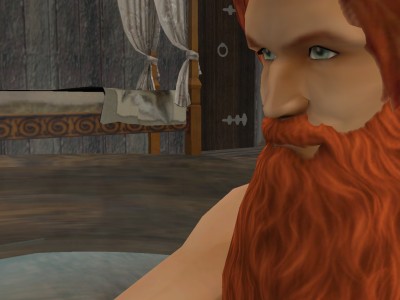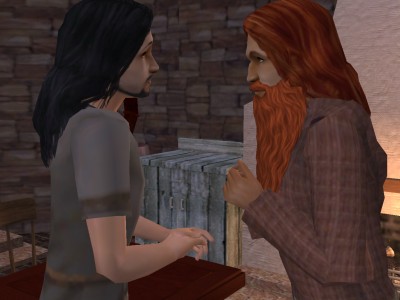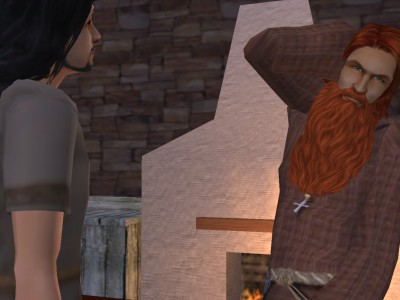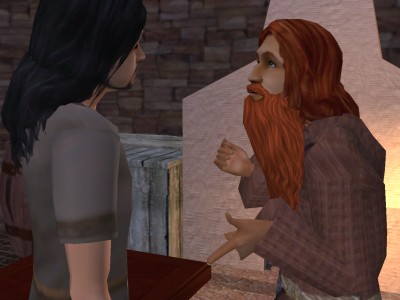Father Brandt decided that Elfleda had had the right idea: he would eat the last of the bread and cheese in his pack and take a bath before presenting himself at the castle. He built a fire and ate while he unpacked, waiting for the water to boil. Once he was in his bath, however, he was free to turn his full attention to his thoughts.

Brandt von Engern was not the childlike man he must have seemed to Elfleda. His mind was sharp as a tack and his attention to detail remarkable. In listening to Elfleda’s chatter he had already learned the names of half the residents of the valley and a good deal of information about the lives of each.
Meanwhile he had observed Elfleda herself, and he had found her to be a bitter, unhappy woman, in spite of her treacly smile. And he did not like the way she said the word “husband.” He would have to get to know her better.
Brandt next turned his thoughts to the kingdom he had just entered, if kingdom it could be called. Colburga’s letter had been cryptic—out of fear, he saw now, for it might have fallen into King William’s hands.
Her family in Saxony had heard no news of her or her husband since the old King Harold had been killed, and her mother had feared that her daughter had been widowed—or worse—in the suppression of the old nobility that followed.
Brandt had told her that he thought young Cenwulf Fritholaf too obscure to merit the attention of William’s executioners, but his stepmother had correctly observed that since Cenwulf’s two brothers had died at Hastings and his father had been killed a month later, the Barony of Wigen had fallen to Cenwulf—not that he could claim it—making him a possible target.
Thus she had been overjoyed to read that Colburga and Cenwulf were not only alive and well, but had two daughters, the oldest of which bore her own name. They could learn little more from the odd letter—no one had heard of a place called Lothere, and Colburga explained nothing except how to get there. She only said that their church needed a priest, and begged him to come.
Affectionate as the letter had been, it did not seem that Colburga was sending for him merely because she missed him, and although there was no explanation of why a Saxon priest was urgently needed, yet it was clear that a local priest would not do.
This, combined with the odd treatment he received at the village in the hills, as well as a few things Elfleda had said, brought him to the conclusion that this “kingdom” called Lothere was not recognized by any except its inhabitants, and that its ruling families had effectively created their own nobility out of the tatters of the old. What he was unable to understand was how they were permitted to live this way—far as they were from London, surely William would consider a few minor nobles from Wessex styling themselves kings and dukes to be a provocation, if not a threat. Brandt was still missing a key piece of information. Ah well, he would learn it when he spoke to Colburga.
Brandt was getting dressed after his bath when he heard an urgent knock at his door. Either Elfleda had spread the word, or someone had seen the fire in the chimney. When he opened the door, he was nearly bowled over by a distraught gentleman who fell on his knees and cried, “Father! Father! I have coveted my neighbor’s wife!”
Father Brandt was dumbfounded. “Young man, is it thus you greet strangers in this kingdom? Get up, get up, what for am I but a humble priest that thou shouldst kneel before me?”
Then he hoisted the small man by the elbows and dumped him squarely on his feet.
“Father!” the man cried, shivering with emotion. “Jupiter! Oh—thank God that you are here!”
“So shall I,” Brandt said dryly, “when I have visited the church. Tell me first thy name and I shall hear thy story thereafter.”
“Alred Sebright, Father—that is, Sir Alred—or—”

“Thou art Alred, Duke of Nothelm, of whom young Elfleda spoke?”
The man pulled his dignity together long enough to execute a smart bow. “I am, if it is not sinful to claim a title to which I was not born.”
Brandt sighed and shuffled around the table to bank the fire. “Young man, thou knowest there are no titles in the only kingdom I regard.”
“What… what was this about Elfleda?” Alred asked shakily. “She spoke of me?”
“Even so, but she has not told me the story of thy neighbor’s wife.”
Alred told him the story: briefly, but full of many big words.
Constant self-reproach over the past month must have led the young man to exaggerate his depravity in his own mind and in his retelling, but Father Brandt saw that the facts of the matter were not so harsh. Alred was a knave, perhaps, but no fiend. He was most clearly a high-mettled young man who had been left too long alone with his guilt. Confession and an uncomfortable penance were all the treatment he required for that. Brandt was more troubled by the state of affairs between Alred and his wife.

“Can you help me, Father?” Alred pleaded.
“Help thee?” Brandt asked, as full of frowns and grumbles as he had been of grins and boyish laughter with Elfleda. He did not want to indulge the young man any further when he had already indulged himself enough.
“How should I help thee? Thou knowest all thy sins shall be forgiven in Heaven.”
“I know, I know… But I want my wife to forgive me here on earth too. I love my wife,” Alred said, his voice quavering. “More than anything. Her and my sons.”
Father Brandt nodded.
“We shall speak later about whom thou must love more than anything. But I shall speak to thy wife when I have the pleasure to see her. Ja? And thou, thou shalt be more humble in thy repentance. Thou hast not committed an unpardonable sin, thou hast only sought thy pleasure without regarding the consequence, and even is it the same for us all. Thy surfeit of guilt is no penitence, but intemperance. And if that Elfleda is a good judge of character, it sounds to me it will not endear thee to thy wife!”





Smart priest.
Let's hope he gets to fix things in the new kingdom!